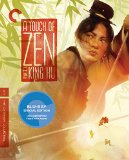| Reviews & Columns |
|
Reviews DVD TV on DVD Blu-ray 4K UHD International DVDs In Theaters Reviews by Studio Video Games Features Collector Series DVDs Easter Egg Database Interviews DVD Talk Radio Feature Articles Columns Anime Talk DVD Savant Horror DVDs The M.O.D. Squad Art House HD Talk Silent DVD
|
DVD Talk Forum |
|
|
| Resources |
|
DVD Price Search Customer Service #'s RCE Info Links |
|
Columns
|
|
|
Touch of Zen: The Criterion Collection, A
The Criterion Collection // Unrated // July 19, 2016
List Price: $39.95 [Buy now and save at Amazon]
The Film:
A three-hour martial arts movie sounds like a daunting viewing experience, I know. Traditionally, the genre's entries from the '70s and '80s aren't celebrated for the substance of their stories, either, often held together with functional tales of vengeance, transcendental training, or political scheming designed to connect vigorous action sequences across, at best, two hours. Therefore, the idea of extending one of those stories by another hour could seem like more trouble than it's worth. Director King Hu's prior body of work had previously telegraphed somewhat more intriguing and emotional plots, though, whether it's Golden Swallow's rescue of a captured family member in Come Drink With Me or the escorting and defense of politically-connected children targeted for assassination in Dragon (Gate) Inn. In A Touch of Zen, King Hu broadens his deeper pursuits and meticulous craftsmanship into an absorbing three hours of quaint family dramatics, mysteries of an enigmatic heroine in hiding, and stunningly-photographed fight scenes, sustaining an intriguing pace and narrative interest throughout.
Beginning with images of smoke wisps flowing behind a spider's web, A Touch of Zen carefully spins its own story of maneuvers and machinations, but it starts with the depiction of a poor mother-son family living off the meager wages earned by the son, Gu Sheng-zhai (Shih Chun), a local portrait artist. Resistant to pursuing more official government work and not funded enough to be a suitable husband, he goes about his days with his aging mother constantly nagging him about his future. Between their daily spats, Gu learns that a neighbor has moved into one of the other adjacent buildings in the abandoned fort within which they live: an attractive young woman, Yang Hui-zhen (Hsu Feng), along with her equally poor family. Eventually, through his own sleuthing and discoveries, Gu learns the truth about his neighbor's identity, that she's a fugitive for being a member of a honorable family who conspired against a corrupt official. Once pursuers arrive to take Yang away, the pair form an unlikely team to combat their advances, mixing Gu's mental faculties and Yang's acquired fighting skill.
Captured with broad-scoped, inherently ornate beauty by cinematographer Hua Hui-ying, A Touch of Zen relishes its introduction to these characters and deepening them within the story, flowing through King Hu's carefully crafted environment while doing so. There's a lot of detail to observe around the abandoned fort where most of the film's activity takes place, from the sun-drenched sprigs of overgrowth to the carved, weathered wood and stone making up the ramshackle residences themselves. A lot of effort was poured into making this environment look beautiful, yet dilapidated and lived-in, an environment with inherent history that's a believable living space for a penniless scholar and artist. Shih Jun's meek, wide-eyed portrayal of Gu Sheng-zhai -- his contentment with meager living and entrancement with the beauty of his next-door neighbor -- makes certain to express that he's not the warrior here, but that his constitution might become useful later on. Around him, A Touch of Zen plants narrative seeds about superstitious belief in ghosts and the artist's resistance to joining the government, connecting its introductory sequences with evenly-spaced nuances that all carry purposes.
Upon the introduction of Yang, a smart layer of deceit and mystery covers A Touch of Zen. King Hu initially uses her enigmatic arrival next-door -- in a shadowy corner of the purportedly haunted fort -- to introduce the possibility of a love interest for Gu, someone of low-enough means that she'd leap at the possibility to marry, well, anyone. Gradually, once more comes to the surface about who she is and what she's capable of, that's slowly revealed to be the furthest thing from the truth: what's learned about her heritage and fighting capabilities transforms the stoic, nearly silent woman into a resolute female presence. The fastidious pacing from King Hu spurs this formation of her character by natural and plausible means through Ku's snooping, bolstered by the melancholy poise bequeathed to Yang by Hsu Feng. What begins as musings about compulsory marriage and assumed romance evolves into the development of a strong heroine from the director responsible for Come Drink With Me, driven not by a schlocky desire to have her conquer all foes, but merely to defend and steel herself against the pursuers.
Confidence is required to execute a martial-arts-oriented epic without unleashing any real martial-arts action in the first hour, yet that's precisely what A Touch of Zen does, allowing the intriguing personal drama to elevate the emotional stakes that lead up to the hand-to-hand brawls and wire work. Against the shadowy backdrops of bamboo forests and throughout the mazy, unkempt space of the abandoned fort, choreographers Han Ying-jie and Pan Yao-kun orchestrate fluid, deliberate fight scenes that extends the conscientious and detail-oriented plotting that came before it, leaving few details unseen in the skirmishes. Elevated by slight touches of whimsy to wow the audience -- feet springing off blades, arrows caught mid-air -- the action embraces an exhilarating middle-ground between brisk realism and airborne beauty. These fights aren't really designed to impress those watching with how lavish or chaotic they can get, though; instead, each one carries precise emotional or thematic connections to Yang's story, making sure that none of them appear contrived for the sake of mandatory action beats.
True to its title, A Touch of Zen also doesn't ignore the gravity of the violence present in the numerous action sequences, attaching philosophical meditations to the moving parts of the politically-driven adventure. From the presence of wise and vastly powerful Buddhist monks to a dreary shift from celebratory to somber tones after someone grasps the repercussions of a bloody premeditated battle, director King Hu integrates blatant observations on earthly values and the sinful motivations of men into his poetic wuxia film. They're uplifted by a distinctive, perhaps unexpected metaphorical ending that departs into more avant-garde ground than the film had previously expressed, one that craftily weaves together its subplots to form an overarching remark on principles and spirituality. Whether that'll resonate with certain viewers will, of course, vary depending on one's ability to roll with these comparatively off-beat punches, but it's hard not to admire King Hu's boldness in capping off his lengthy creation with an obscure resolution, yet another skillful way A Touch of Zen departs from expectations.
The Blu-ray:
The Criterion Collection have brought A Touch of Zen into their fold as spine #825, sporting freshly commissioned artwork for the beautiful painterly front cover. The packaging arrives as one would expect from standard Criterion releases, though one might be surprised to see that the three-hour film and all its supplements have been crammed onto one Blu-ray disc. Subtly noisy red inner artwork contrasts the yellow and green-hued front cover, as well as the foldout Poster/Booklet that contains information about the transfer, production credits, and a pair of textual extras: an essay from David Bordwell entitled "Prowling, Scheming, Flying", and some notes on A Touch of Zen written by King Hu that were republished from a 1975 press kit.
Video and Audio:
Actress Hsu Feng coordinated with the Taiwanese Film Institute and Italian film restoration house L'Immagine Ritrovata to preserve A Touch of Zen, which they've done in a mostly stunning, albeit flawed 4K scan, derived from a 35mm negative that was largely in good shape. Janus Films and The Criterion Collection have presented the restoration in its 2.35:1-framed aspect ratio through a 1080p AVC treatment, which, considering the fact that the three-hour film also shares space with a good number of extras, looks pretty phenomenal. Granted, there are some inherent flaws with the print that take the treatment down a few notches. most prominent being a few lingering smudges on the image throughout. Aside from that, and a heavier veil of grain in certain areas of the image, there's a lot of beauty to be found in this '70s martial-arts film: the delicate tans of foliage and robust greens of a forest; the faint strokes of a paintbrush and the firm ornate wood textures of the fort; the splattering of blood against canvas and the graceful movement of light beams through trees. Skin tones are rich and well-defined. Fine details in the umerous close-ups on Hsu Feng and Shih Chun encapsulate tremendous innate detail. Contrast levels are largely impressive and balanced, aside from a few darker nighttime sequences that encroach on underlying details. And the subtle fog spotted throughout the film retails its shadowy shapes and awareness of pools of light. A Touch of Zen looks gorgeous.
Also remastered from a 35mm negative, A Touch of Zen's audio delights might not be able to sound much better than they do in this uncompressed LPCM monaural track. The sound presentation has a lot of positives going for it, notably in the stunning musical score's range of heft and subtle notes, often powered by rhythmic strums and picks of a stringed instrument to create tension. Small, atmospheric effects like the stoking of fire, the clanking of dinnerware, the sound of fluid spit onto a wood column and the shuffling of feet on rocks are surprisingly clean and aware of higher-end nuance. Broader effects like the clang of blades and the high-pitched twang of sunray "magic" are surprisingly aware of upper-end clarity and balance as well. Dialogue varies from scene to scene, though, ranging from clear and well-attuned to a middle-range natural presence to somewhat raspy and erring on the thin, higher-pitched side of things. And despite the restoration, one can hear a bit of vintage hiss and distortion in a few spots. Imperfect, yes, not as high caliber as the transfer and restrained by its source, but the sound quality ultimately doesn't disappoint alongside the beautiful visual restoration. The newly-translated English subtitles are rather fantastic.
Special Features:
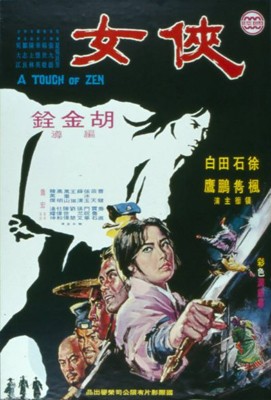 A pair of new interviews conducted by the Criterion Collection lead the charge for the extras in A Touch of Zen, starting off with one from star Hsu Feng (13:47, 16x9). Accompanied by clips from both the featured film and Dragon Inn, she chats about what it was like to work with King Hu's meticulousness, the casting process alongside other big actresses during the time, and her involvement with the restoration process for the film itself. They've also recorded an interview with Shih Chun (17:27, 16x9 HD), which takes a similar approach by discussing how he got a late start to the acting industry and how King Hu discovered him, how everyone participated in the production's many facets (including what he, Hsu Feng, and the director built), as well as the naturalness of dialogue and timing their shoots with growth patterns of grass ... and why it impacted the length of the shoot schedule. Both are accompanied with great production stills, making for roughly 30 minutes of terrific interview time.
A pair of new interviews conducted by the Criterion Collection lead the charge for the extras in A Touch of Zen, starting off with one from star Hsu Feng (13:47, 16x9). Accompanied by clips from both the featured film and Dragon Inn, she chats about what it was like to work with King Hu's meticulousness, the casting process alongside other big actresses during the time, and her involvement with the restoration process for the film itself. They've also recorded an interview with Shih Chun (17:27, 16x9 HD), which takes a similar approach by discussing how he got a late start to the acting industry and how King Hu discovered him, how everyone participated in the production's many facets (including what he, Hsu Feng, and the director built), as well as the naturalness of dialogue and timing their shoots with growth patterns of grass ... and why it impacted the length of the shoot schedule. Both are accompanied with great production stills, making for roughly 30 minutes of terrific interview time.
The Criterion Collection recorded two more interviews for A Touch of Zen involving outside admirers, starting with Ang Lee (13:35, 16x9 HD), whose craftsmanship in Crouching Tiger Hidden Dragon was clearly influenced by King Hu's style. Ang Lee discusses how the director brought "art" to Chinese cinema and the state of culture in the country at the time, his usage of space and crafting of mood akin to Chinese opera, a few musings about the direct ties between his own wuxia epic and King Hu's film, and some interesting general musings about wire-work. There's also a piece recorded by film critic Tony Rayns (34:05, 16x9 HD), who discusses King Hu's entrance into the martial-arts genre and the operatic roots of his style, while also filling in some of the more refined details about the production of A Touch of Zen, such as construction timeframes and ties to the Ming Dynasty aesthetic. About halfway in, Rayns really digs into the film's components themselves, breaking from the repetition of the first half of this interview.
The Criterion Collection have also included a lengthy documentary on King Hu: 1932-1997 (47:58, 16x9 HD) composed in 2012, which features film historians, actors, and production members offering their impressions on the director in various languages. Viewing this documentary after the cluster of new interviews will yield a lot of repetition in content about the director's craftsmanship but seeing the broad collection of participants, hearing their personal anecdotes, and viewing clips from other films with King Hu's involvement holds one interest regardless. Finally, they've also included Janus Film's Trailer (1:41, 16x9 HD) for A Touch of Zen.
Final Thoughts:
A Touch of Zen might be an intimidating three hours long, but Director King Hu's fluid and gorgeous craftsmanship, attention to character details, and grounded but not too grounded action choreography makes the time fly by, in a way that feels like it's of a similar length to its shorter contemporaries. Telling the story of how a scholarly painter and a group of Buddhist monks assist the fugitive offspring of an honorable whistleblower, this martial-arts epic uses its artistry and well-spaced fight choreography to create a truly distinctive entry in the genre, one that sidesteps the period's B-movie inelegance and evokes a reputable amount of underlying thematic substance. The Criterion Collection's Blu-ray carries over a new restoration of King Hu's film to tremendous results, sporting above-average audiovisual strength considering the film's vintage and sporting a wealth of fantastic extras, including a foursome of new interviews and a forty-five minute documentary on the director. Very, very Highly Recommended.
Thomas Spurlin, Staff Reviewer -- DVDTalk Reviews | Personal Blog/Site
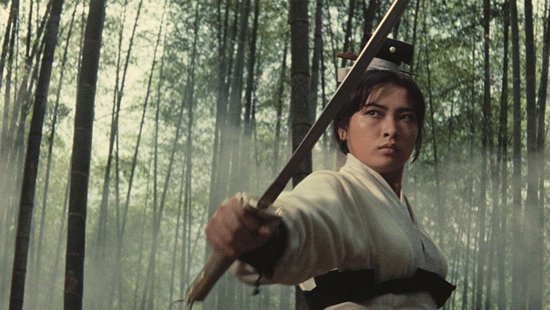 |
A three-hour martial arts movie sounds like a daunting viewing experience, I know. Traditionally, the genre's entries from the '70s and '80s aren't celebrated for the substance of their stories, either, often held together with functional tales of vengeance, transcendental training, or political scheming designed to connect vigorous action sequences across, at best, two hours. Therefore, the idea of extending one of those stories by another hour could seem like more trouble than it's worth. Director King Hu's prior body of work had previously telegraphed somewhat more intriguing and emotional plots, though, whether it's Golden Swallow's rescue of a captured family member in Come Drink With Me or the escorting and defense of politically-connected children targeted for assassination in Dragon (Gate) Inn. In A Touch of Zen, King Hu broadens his deeper pursuits and meticulous craftsmanship into an absorbing three hours of quaint family dramatics, mysteries of an enigmatic heroine in hiding, and stunningly-photographed fight scenes, sustaining an intriguing pace and narrative interest throughout.
Beginning with images of smoke wisps flowing behind a spider's web, A Touch of Zen carefully spins its own story of maneuvers and machinations, but it starts with the depiction of a poor mother-son family living off the meager wages earned by the son, Gu Sheng-zhai (Shih Chun), a local portrait artist. Resistant to pursuing more official government work and not funded enough to be a suitable husband, he goes about his days with his aging mother constantly nagging him about his future. Between their daily spats, Gu learns that a neighbor has moved into one of the other adjacent buildings in the abandoned fort within which they live: an attractive young woman, Yang Hui-zhen (Hsu Feng), along with her equally poor family. Eventually, through his own sleuthing and discoveries, Gu learns the truth about his neighbor's identity, that she's a fugitive for being a member of a honorable family who conspired against a corrupt official. Once pursuers arrive to take Yang away, the pair form an unlikely team to combat their advances, mixing Gu's mental faculties and Yang's acquired fighting skill.
Captured with broad-scoped, inherently ornate beauty by cinematographer Hua Hui-ying, A Touch of Zen relishes its introduction to these characters and deepening them within the story, flowing through King Hu's carefully crafted environment while doing so. There's a lot of detail to observe around the abandoned fort where most of the film's activity takes place, from the sun-drenched sprigs of overgrowth to the carved, weathered wood and stone making up the ramshackle residences themselves. A lot of effort was poured into making this environment look beautiful, yet dilapidated and lived-in, an environment with inherent history that's a believable living space for a penniless scholar and artist. Shih Jun's meek, wide-eyed portrayal of Gu Sheng-zhai -- his contentment with meager living and entrancement with the beauty of his next-door neighbor -- makes certain to express that he's not the warrior here, but that his constitution might become useful later on. Around him, A Touch of Zen plants narrative seeds about superstitious belief in ghosts and the artist's resistance to joining the government, connecting its introductory sequences with evenly-spaced nuances that all carry purposes.
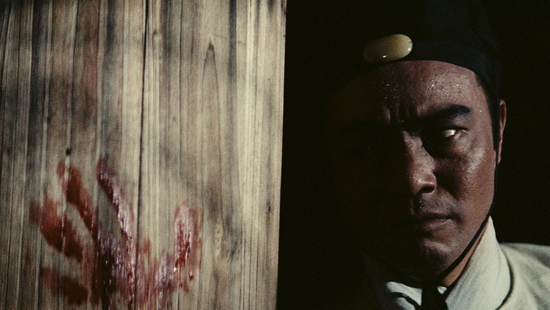 |
Upon the introduction of Yang, a smart layer of deceit and mystery covers A Touch of Zen. King Hu initially uses her enigmatic arrival next-door -- in a shadowy corner of the purportedly haunted fort -- to introduce the possibility of a love interest for Gu, someone of low-enough means that she'd leap at the possibility to marry, well, anyone. Gradually, once more comes to the surface about who she is and what she's capable of, that's slowly revealed to be the furthest thing from the truth: what's learned about her heritage and fighting capabilities transforms the stoic, nearly silent woman into a resolute female presence. The fastidious pacing from King Hu spurs this formation of her character by natural and plausible means through Ku's snooping, bolstered by the melancholy poise bequeathed to Yang by Hsu Feng. What begins as musings about compulsory marriage and assumed romance evolves into the development of a strong heroine from the director responsible for Come Drink With Me, driven not by a schlocky desire to have her conquer all foes, but merely to defend and steel herself against the pursuers.
Confidence is required to execute a martial-arts-oriented epic without unleashing any real martial-arts action in the first hour, yet that's precisely what A Touch of Zen does, allowing the intriguing personal drama to elevate the emotional stakes that lead up to the hand-to-hand brawls and wire work. Against the shadowy backdrops of bamboo forests and throughout the mazy, unkempt space of the abandoned fort, choreographers Han Ying-jie and Pan Yao-kun orchestrate fluid, deliberate fight scenes that extends the conscientious and detail-oriented plotting that came before it, leaving few details unseen in the skirmishes. Elevated by slight touches of whimsy to wow the audience -- feet springing off blades, arrows caught mid-air -- the action embraces an exhilarating middle-ground between brisk realism and airborne beauty. These fights aren't really designed to impress those watching with how lavish or chaotic they can get, though; instead, each one carries precise emotional or thematic connections to Yang's story, making sure that none of them appear contrived for the sake of mandatory action beats.
True to its title, A Touch of Zen also doesn't ignore the gravity of the violence present in the numerous action sequences, attaching philosophical meditations to the moving parts of the politically-driven adventure. From the presence of wise and vastly powerful Buddhist monks to a dreary shift from celebratory to somber tones after someone grasps the repercussions of a bloody premeditated battle, director King Hu integrates blatant observations on earthly values and the sinful motivations of men into his poetic wuxia film. They're uplifted by a distinctive, perhaps unexpected metaphorical ending that departs into more avant-garde ground than the film had previously expressed, one that craftily weaves together its subplots to form an overarching remark on principles and spirituality. Whether that'll resonate with certain viewers will, of course, vary depending on one's ability to roll with these comparatively off-beat punches, but it's hard not to admire King Hu's boldness in capping off his lengthy creation with an obscure resolution, yet another skillful way A Touch of Zen departs from expectations.
The Blu-ray:
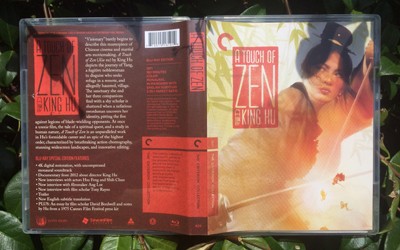 | 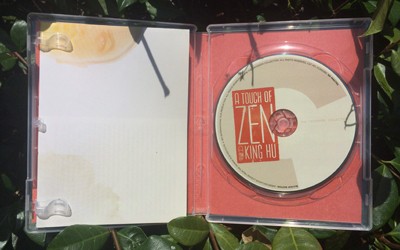 |
The Criterion Collection have brought A Touch of Zen into their fold as spine #825, sporting freshly commissioned artwork for the beautiful painterly front cover. The packaging arrives as one would expect from standard Criterion releases, though one might be surprised to see that the three-hour film and all its supplements have been crammed onto one Blu-ray disc. Subtly noisy red inner artwork contrasts the yellow and green-hued front cover, as well as the foldout Poster/Booklet that contains information about the transfer, production credits, and a pair of textual extras: an essay from David Bordwell entitled "Prowling, Scheming, Flying", and some notes on A Touch of Zen written by King Hu that were republished from a 1975 press kit.
Video and Audio:
Actress Hsu Feng coordinated with the Taiwanese Film Institute and Italian film restoration house L'Immagine Ritrovata to preserve A Touch of Zen, which they've done in a mostly stunning, albeit flawed 4K scan, derived from a 35mm negative that was largely in good shape. Janus Films and The Criterion Collection have presented the restoration in its 2.35:1-framed aspect ratio through a 1080p AVC treatment, which, considering the fact that the three-hour film also shares space with a good number of extras, looks pretty phenomenal. Granted, there are some inherent flaws with the print that take the treatment down a few notches. most prominent being a few lingering smudges on the image throughout. Aside from that, and a heavier veil of grain in certain areas of the image, there's a lot of beauty to be found in this '70s martial-arts film: the delicate tans of foliage and robust greens of a forest; the faint strokes of a paintbrush and the firm ornate wood textures of the fort; the splattering of blood against canvas and the graceful movement of light beams through trees. Skin tones are rich and well-defined. Fine details in the umerous close-ups on Hsu Feng and Shih Chun encapsulate tremendous innate detail. Contrast levels are largely impressive and balanced, aside from a few darker nighttime sequences that encroach on underlying details. And the subtle fog spotted throughout the film retails its shadowy shapes and awareness of pools of light. A Touch of Zen looks gorgeous.
Also remastered from a 35mm negative, A Touch of Zen's audio delights might not be able to sound much better than they do in this uncompressed LPCM monaural track. The sound presentation has a lot of positives going for it, notably in the stunning musical score's range of heft and subtle notes, often powered by rhythmic strums and picks of a stringed instrument to create tension. Small, atmospheric effects like the stoking of fire, the clanking of dinnerware, the sound of fluid spit onto a wood column and the shuffling of feet on rocks are surprisingly clean and aware of higher-end nuance. Broader effects like the clang of blades and the high-pitched twang of sunray "magic" are surprisingly aware of upper-end clarity and balance as well. Dialogue varies from scene to scene, though, ranging from clear and well-attuned to a middle-range natural presence to somewhat raspy and erring on the thin, higher-pitched side of things. And despite the restoration, one can hear a bit of vintage hiss and distortion in a few spots. Imperfect, yes, not as high caliber as the transfer and restrained by its source, but the sound quality ultimately doesn't disappoint alongside the beautiful visual restoration. The newly-translated English subtitles are rather fantastic.
Special Features:
 A pair of new interviews conducted by the Criterion Collection lead the charge for the extras in A Touch of Zen, starting off with one from star Hsu Feng (13:47, 16x9). Accompanied by clips from both the featured film and Dragon Inn, she chats about what it was like to work with King Hu's meticulousness, the casting process alongside other big actresses during the time, and her involvement with the restoration process for the film itself. They've also recorded an interview with Shih Chun (17:27, 16x9 HD), which takes a similar approach by discussing how he got a late start to the acting industry and how King Hu discovered him, how everyone participated in the production's many facets (including what he, Hsu Feng, and the director built), as well as the naturalness of dialogue and timing their shoots with growth patterns of grass ... and why it impacted the length of the shoot schedule. Both are accompanied with great production stills, making for roughly 30 minutes of terrific interview time.
A pair of new interviews conducted by the Criterion Collection lead the charge for the extras in A Touch of Zen, starting off with one from star Hsu Feng (13:47, 16x9). Accompanied by clips from both the featured film and Dragon Inn, she chats about what it was like to work with King Hu's meticulousness, the casting process alongside other big actresses during the time, and her involvement with the restoration process for the film itself. They've also recorded an interview with Shih Chun (17:27, 16x9 HD), which takes a similar approach by discussing how he got a late start to the acting industry and how King Hu discovered him, how everyone participated in the production's many facets (including what he, Hsu Feng, and the director built), as well as the naturalness of dialogue and timing their shoots with growth patterns of grass ... and why it impacted the length of the shoot schedule. Both are accompanied with great production stills, making for roughly 30 minutes of terrific interview time. The Criterion Collection recorded two more interviews for A Touch of Zen involving outside admirers, starting with Ang Lee (13:35, 16x9 HD), whose craftsmanship in Crouching Tiger Hidden Dragon was clearly influenced by King Hu's style. Ang Lee discusses how the director brought "art" to Chinese cinema and the state of culture in the country at the time, his usage of space and crafting of mood akin to Chinese opera, a few musings about the direct ties between his own wuxia epic and King Hu's film, and some interesting general musings about wire-work. There's also a piece recorded by film critic Tony Rayns (34:05, 16x9 HD), who discusses King Hu's entrance into the martial-arts genre and the operatic roots of his style, while also filling in some of the more refined details about the production of A Touch of Zen, such as construction timeframes and ties to the Ming Dynasty aesthetic. About halfway in, Rayns really digs into the film's components themselves, breaking from the repetition of the first half of this interview.
The Criterion Collection have also included a lengthy documentary on King Hu: 1932-1997 (47:58, 16x9 HD) composed in 2012, which features film historians, actors, and production members offering their impressions on the director in various languages. Viewing this documentary after the cluster of new interviews will yield a lot of repetition in content about the director's craftsmanship but seeing the broad collection of participants, hearing their personal anecdotes, and viewing clips from other films with King Hu's involvement holds one interest regardless. Finally, they've also included Janus Film's Trailer (1:41, 16x9 HD) for A Touch of Zen.
Final Thoughts:
A Touch of Zen might be an intimidating three hours long, but Director King Hu's fluid and gorgeous craftsmanship, attention to character details, and grounded but not too grounded action choreography makes the time fly by, in a way that feels like it's of a similar length to its shorter contemporaries. Telling the story of how a scholarly painter and a group of Buddhist monks assist the fugitive offspring of an honorable whistleblower, this martial-arts epic uses its artistry and well-spaced fight choreography to create a truly distinctive entry in the genre, one that sidesteps the period's B-movie inelegance and evokes a reputable amount of underlying thematic substance. The Criterion Collection's Blu-ray carries over a new restoration of King Hu's film to tremendous results, sporting above-average audiovisual strength considering the film's vintage and sporting a wealth of fantastic extras, including a foursome of new interviews and a forty-five minute documentary on the director. Very, very Highly Recommended.
|
| Popular Reviews |
| Sponsored Links |
|
|
| Sponsored Links |
|
|
| Release List | Reviews | Shop | Newsletter | Forum | DVD Giveaways | Blu-Ray | Advertise |
|
Copyright 2024 DVDTalk.com All Rights Reserved. Legal Info, Privacy Policy, Terms of Use,
Manage Preferences,
Your Privacy Choices | |||||||









